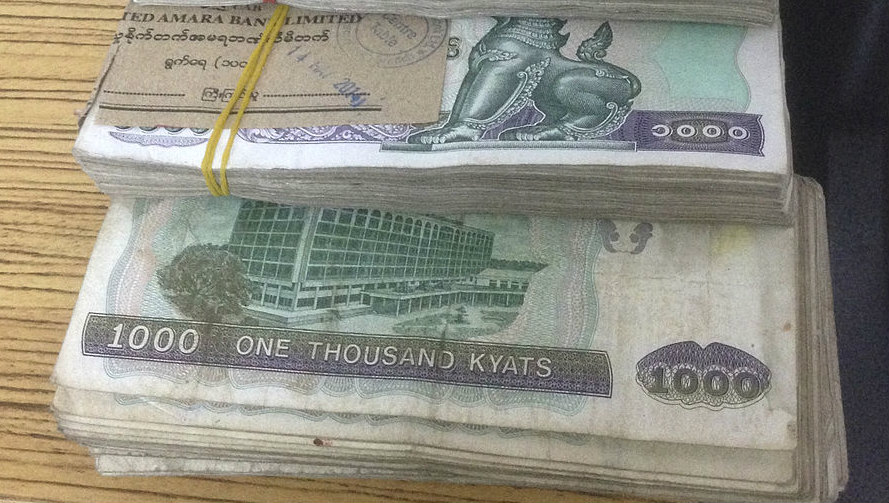In a snap decision that has left many bewildered, Myanmar’s central bank has announced that businesses have until the end of November to stop charging in US dollars.
Restaurants, hotels and other firms have to hand back the special licenses that allow them to convert US currency. It’s an effort to stabilize the kyat, which has dropped rapidly against the greenback over the past six months.
We asked Sean Turnell, a longtime observer on Myanmar’s economy who has worked as an advisor for opposition leader Aung San Suu Kyi, to break it down for us.
How might this change affect people in Myanmar – both locals and foreigners?
It will create difficulties for both. For foreigners, it will mean exchanging the foreign currency they bring in for ‘bricks’ of kyats to pay for accommodation and other things. This must now take place at banks instead of simply handing over (smaller) wads of $US over the counters at shops and hotels. It might also mean a certain uncertainty with respect to how much things cost, since presumably prices listed in $US and the like will be disallowed.
For local operators of tourism businesses this will be a real headache. For one, they will have to deal with customer confusion. In the immediate future, before tourist advice catches up, many will arrive with their $US and their foreign credit cards. The latter can be used at banks, but presumably not at shops and hotels, since foreign banks do not settle kyat transactions offshore (thus, at the moment, foreign credit cards are only used in Myanmar for foreign currency transactions, except when they are used at banks themselves).
The confusion and uncertainty of all of this will also drive much foreign exchange activity into the hands of Myanmar’s venerable black-market currency dealers – who might just be the one set of ‘gainers’ from it all.
Are some hotels and businesses excluded or is it all-encompassing?
It would seem to be all-encompassing.
Is it going to affect international transactions for the average person? For example, getting paid in a foreign currency into a foreign account or using an international credit card at point-of-sale.
Yes, and it is hard to imagine how domestic credit and debit cards are substitutes for foreign currency transactions. Clearly they are not for foreign tourists (who don’t have them!), but also for locals. Why? Well, locals hold $US because they trust the currency as a reliable store of value. Nothing in this latest decision will change this. Indeed, the sudden and arbitrary nature of the recent announcements will only add to the distrust the people of Myanmar have in domestic institutions – and drive them further into perceived safer assets. In short – this latest policy is very likely self-defeating and counter-productive.
What about businesses looking to start up in Myanmar?
Practical problems: what does this mean for foreign staff paid in foreign currency? But, more importantly, is the symbolism – the reminder that Myanmar is a place where capricious decision making, sudden policy reversals, are commonplace. In other words, risk perceptions ramp up.
Is this the first time the country has implemented a dramatic, China-style policy to control its currency like this?
No, but it never works, anywhere. Again, at the heart of this is a lack of trust in domestic institutions, of which a country’s currency is the most fundamental. Nothing in all of this improves matters on this front – indeed, as we have noted, quite the opposite.
Photo / Clay Gilliland / Wikicommons
Correction: An earlier version of this post stated that the forex licenses had to be returned by the end of October. The deadline is actually the end of November. We apologize for the error.




